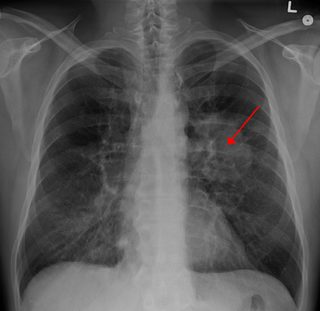
Lung cancer, also known as lung carcinoma, is a malignant tumor that begins in the lung. Lung cancer is caused by genetic damage to the DNA of cells in the airways, often caused by cigarette smoking or inhaling damaging chemicals. Damaged airway cells gain the ability to multiply unchecked, causing the growth of a tumor. Without treatment, tumors spread throughout the lung, damaging lung function. Eventually lung tumors metastasize, spreading to other parts of the body.

Tobacco smoking is the practice of burning tobacco and ingesting the resulting smoke. The smoke may be inhaled, as is done with cigarettes, or simply released from the mouth, as is generally done with pipes and cigars. The practice is believed to have begun as early as 5000–3000 BC in Mesoamerica and South America. Tobacco was introduced to Eurasia in the late 17th century by European colonists, where it followed common trade routes. The practice encountered criticism from its first import into the Western world onwards but embedded itself in certain strata of a number of societies before becoming widespread upon the introduction of automated cigarette-rolling apparatus.

Smoking cessation, usually called quitting smoking or stopping smoking, is the process of discontinuing tobacco smoking. Tobacco smoke contains nicotine, which is addictive and can cause dependence. As a result, nicotine withdrawal often makes the process of quitting difficult.

Smoking bans, or smoke-free laws, are public policies, including criminal laws and occupational safety and health regulations, that prohibit tobacco smoking in certain spaces. The spaces most commonly affected by smoking bans are indoor workplaces and buildings open to the public such as restaurants, bars, office buildings, schools, retail stores, hospitals, libraries, transport facilities, and government buildings, in addition to public transport vehicles such as aircraft, buses, watercraft, and trains. However, laws may also prohibit smoking in outdoor areas such as parks, beaches, pedestrian plazas, college and hospital campuses, and within a certain distance from the entrance to a building, and in some cases, private vehicles and multi-unit residences.
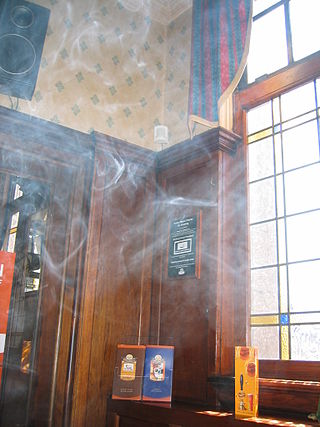
Passive smoking is the inhalation of tobacco smoke, commonly called secondhand smoke (SHS) or environmental tobacco smoke (ETS), by persons other than the active smoker. It occurs when tobacco smoke diffuses into the surrounding atmosphere as an aerosol pollutant, which leads to its inhalation by nearby bystanders within the same environment. Exposure to secondhand tobacco smoke causes many of the same diseases caused by active tobacco smoking, although to a lower prevalence due to the reduced concentration of smoke that enters the airway. The health risks of secondhand smoke are a matter of scientific consensus, and have been a major motivation for smoke-free laws in workplaces and indoor venues, including restaurants, bars and night clubs, as well as some open public spaces.

Tobacco products, especially when smoked or used orally, have negative effects on human health, and concerns about these effects have existed for a long time. Research has focused primarily on cigarette smoking.

A cigarette filter, also known as a filter tip, is a component of a cigarette, along with cigarette paper, capsules and adhesives. Filters were introduced in the early 1950s.
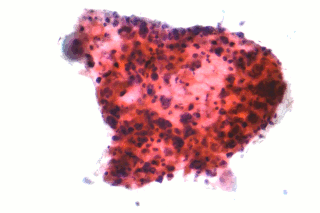
Non-small-cell lung cancer (NSCLC), or non-small-cell lung carcinoma, is any type of epithelial lung cancer other than small-cell lung cancer (SCLC). NSCLC accounts for about 85% of all lung cancers. As a class, NSCLCs are relatively insensitive to chemotherapy, compared to small-cell carcinoma. When possible, they are primarily treated by surgical resection with curative intent, although chemotherapy has been used increasingly both preoperatively and postoperatively.
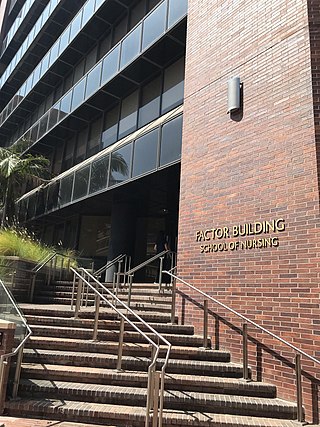
The UCLA School of Nursing is a nursing school affiliated with UCLA, and is located in the Westwood neighborhood of Los Angeles, California. The school is housed in the Doris and Louis Factor Health Sciences Building, known as the Factor Building, on the south end of UCLA's 400-plus-acre campus, adjacent to the Ronald Reagan UCLA Medical Center.
Third-hand smoke is contamination by tobacco smoke that lingers following the extinguishing of a cigarette, cigar, or other combustible tobacco product. First-hand smoke refers to what is inhaled into the smoker's own lungs, while second-hand smoke is a mixture of exhaled smoke and other substances leaving the smoldering end of the cigarette that enters the atmosphere and can be inhaled by others. Third-hand smoke or "THS" is a neologism coined by a research team from the Dana–Farber/Harvard Cancer Center, where "third-hand" is a reference to the smoking residue on surfaces after "second-hand smoke" has cleared out.

Smoking is a practice in which a substance is combusted and the resulting smoke is typically inhaled to be tasted and absorbed into the bloodstream of a person. Most commonly, the substance used is the dried leaves of the tobacco plant, which have been rolled with a small rectangle of paper into an elongated cylinder called a cigarette. Other forms of smoking include the use of a smoking pipe or a bong.

Nicotine dependence is a state of dependence upon nicotine. Nicotine dependence is a chronic, relapsing disease defined as a compulsive craving to use the drug, despite social consequences, loss of control over drug intake, and emergence of withdrawal symptoms. Tolerance is another component of drug dependence. Nicotine dependence develops over time as a person continues to use nicotine. The most commonly used tobacco product is cigarettes, but all forms of tobacco use and e-cigarette use can cause dependence. Nicotine dependence is a serious public health problem because it leads to continued tobacco use, which is one of the leading preventable causes of death worldwide, causing more than 8 million deaths per year.
Large-cell lung carcinoma (LCLC), or large-cell carcinoma (LCC) in short, is a heterogeneous group of undifferentiated malignant neoplasms that lack the cytologic and architectural features of small cell carcinoma and glandular or squamous differentiation. LCC is categorized as a type of NSCLC which originates from epithelial cells of the lung.
The Oncology Nursing Society (ONS) is a nonprofit membership organization of more than 35,000 members committed to promoting excellence in oncology nursing and the transformation of cancer care.
The scientific community in the United States and Europe are primarily concerned with the possible effect of electronic cigarette use on public health. There is concern among public health experts that e-cigarettes could renormalize smoking, weaken measures to control tobacco, and serve as a gateway for smoking among youth. The public health community is divided over whether to support e-cigarettes, because their safety and efficacy for quitting smoking is unclear. Many in the public health community acknowledge the potential for their quitting smoking and decreasing harm benefits, but there remains a concern over their long-term safety and potential for a new era of users to get addicted to nicotine and then tobacco. There is concern among tobacco control academics and advocates that prevalent universal vaping "will bring its own distinct but as yet unknown health risks in the same way tobacco smoking did, as a result of chronic exposure", among other things.
The Center for Indoor Air Research was a tobacco industry front group established by three American tobacco companies—Philip Morris, R.J. Reynolds, and Lorillard—in Linthicum, Maryland, in 1988. The organization funded research on indoor air pollution, some of which pertained to passive smoking and some of which did not. It also funded research pertaining to causes of lung cancer other than passive smoking, such as diet. The organization disbanded in 1998 as a result of the Tobacco Master Settlement Agreement.
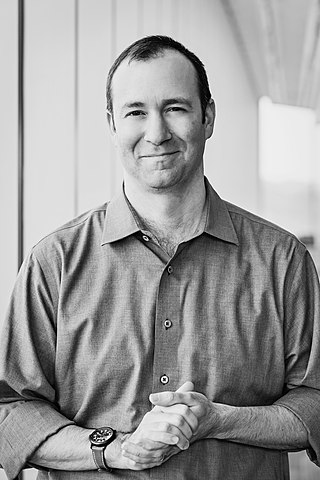
Christopher Ryan Friese is an American nurse scientist. In 2020, he was elected to membership in the National Academy of Medicine and in 2021, was appointed to the National Cancer Advisory Board.
Raymond Javan Chan is an Australian oncology nurse, clinical trialist, researcher, and senior administrator. He is Matthew Flinders Professor of Cancer Nursing, and Director of the Caring Futures Institute and Dean of Research within the College of Nursing and Health Sciences, Flinders University. He also holds academic titles as NHMRC Investigator Fellow and Matthew Flinders Fellow. He also currently holds an NHMRC Investigator Fellowship.
Patsy Yates is an Australian registered nurse, university professor, and institutional leader who works at the Queensland University of Technology (Brisbane), where she is a Distinguished Professor and Executive Dean of the Faculty of Health, Research Director of the Centre for Palliative Care Research and Education, and Co-Director of the Centre for Healthcare Transformation. She is a specialist in the field of palliative, cancer and aged care.
Ellen R. Gritz is an American psychologist and cancer researcher. She is Professor and Chair Emerita of the Department of Behavioral Science and Olla S. Stribling Distinguished Chair for Cancer Research at The University of Texas M. D. Anderson Cancer Center.











